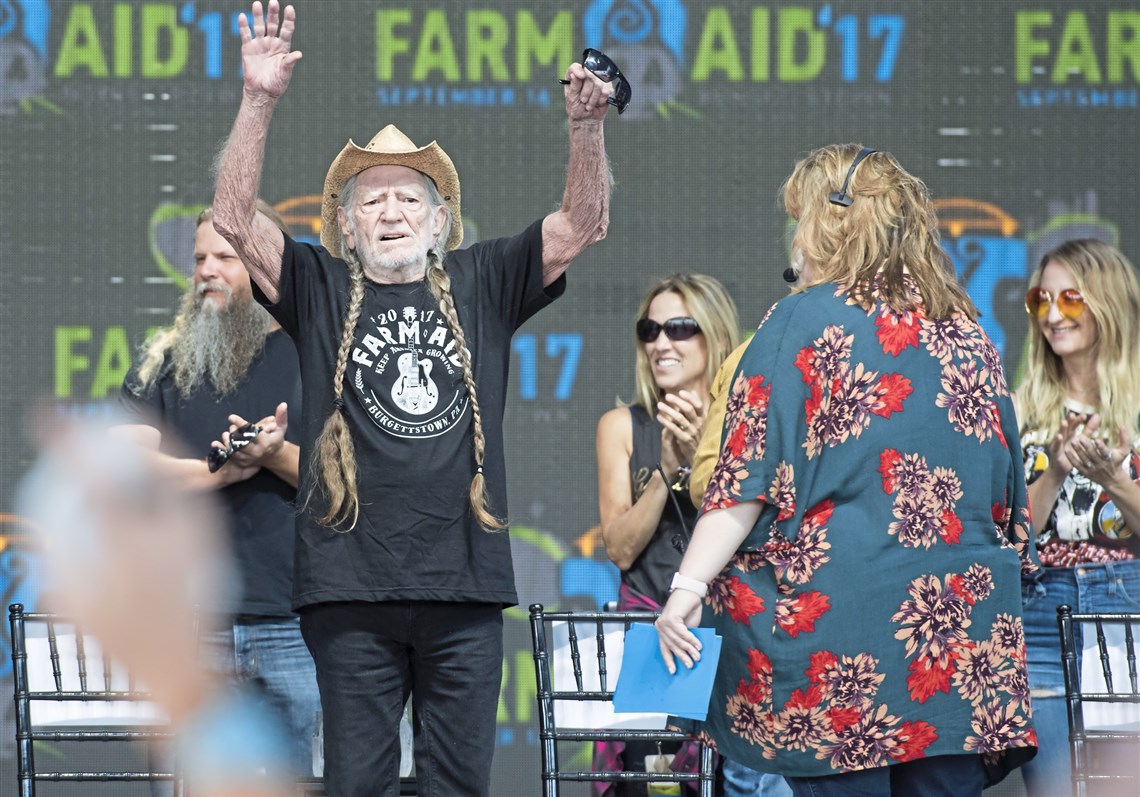Pittsburgh Post-Gazette: Farm Aid stars come to a positive message and a warning
by Scott Mervis | September 16, 2017
Before the bands started at the 32nd annual Farm Aid on Saturday, Don Kretschmann, an organic farmer from Zelienople, sat on stage with legendary Farm Aid board members Willie Nelson, Neil Young, John Mellencamp and Dave Matthews, and he stated a simple truth: “Without farming, there would be no life.”
Mr. Kretschman, who has been delivering his produce into Pittsburgh neighborhoods for decades, said that he was graduating from college as a physics major during the Vietnam War and saw his future as building the “newest and latest weapon.” Instead, he became an organic farmer, a pursuit that has allowed him to say, “I never have to be ashamed of what I’ve done.”
While family farmers are struggling, just as they were in 1985 when Farm Aid was launched, soon after Live Aid, the nonprofit organizaton came to our area for the first time since 2002 with a positive message on Saturday, relaying the stories of food growers who are making it work.
In the press conference that preceded the concert, they featured a West Virginia farm family that transitioned from mill and mine work to farming, and found a way to sell their product directly to the consumer. They also introduced Ayanna Jones, an urban farmer at the Sankofa Village Community Garden in Homewood, who condemned what she deemed the “food apartheid” that was impacting the black community.
Speaking of her efforts to get young people involved in urban farming, she said, “We have to dispel the slave mentality around tilling the earth,” not to mention the distaste that young people have for getting their sneakers dirty.
Mr. Matthews, who joined the Farm Aid board in 2002, echoed that idea. “I do think that in general, people have become very disconnected from the earth and we sort of pride ourselves in not being part of the earth in some strange way. There’s a weird thing that’s happened to us culturally…being afraid of getting our hands dirty. The great thing about urban agriculture is we can learn the power that we have and the power that’s inherent in the earth growing our food. It changes how we can connect to everything if we can get our hands dirty.”
Darwin Stemple, a third generation farmer from Preston County, West Virginia, wore his clean boots on Saturday, in making the two-and-a-half hour trip to the Pavilion for the first time to take in the show and see himself as part of Farm Aid’s video package. His story had to do with joining forces with other farms to create a co-op to market to schools and consumers.
“What we do sometimes seems meaningless,” he said, before the conference. “But we’re the sustainability of this country. Everybody needs food and even though we’re small farms, we’re a vital part of providing food, and for them to recognize us — for anyone to recognize us — is major.”
His biggest challenge, he said, was competing with cheap, imported food that he noted sometimes sits around on trucks for weeks. His more immediate challenge, he said, was an Asian insect that ruined his raspberry crop this season.
Willie Nelson, the president of Farm Aid, riffed on that idea, saying that 32 years after these concerts began, “The farmers are moving on their own pretty well. They’ve figured out organic farming, they figured out farm-to-market. All the people have figured out where to buy their farm-to-market eggs. They don’t have to come from 1,500 miles away on a truck.”
Mr. Mellencamp, the rocker from Indiana who was writing songs about the plight of farmers a few years before Farm Aid began, managed to find a parallel between farmers and musicians.
“Every business,” he said, “has to plan for the future and you can’t live in the past and think that it’s going to support you. Us guys in the record business, what we signed on to do originally doesn’t even exist anymore. We don’t sell records anymore, we just send postcards. …”
He equated hanging on to old industry like coal to trying to keep alive drive-in theaters, probably unaware that there’s one a little over 10 miles away in Moon.
Mr. Young didn’t target agricultural giant Monsanto like he did two years ago on “The Monsanto Years,” but he brought a stinging message to the stage relating to a recent presidential campaign.
“A subject I wanted to get off mind is that America is already great,” he said to applause. ‘It’s great! We don’t need to apologize, we don’t need to feel bad. If you watch TV, you’re going to feel bad because all they talk about is bad things. All they talk about is what’s wrong with this, what’s wrong with that, and how they can defeat it, or they can kill it, or they can be a street fighter and take it on. That’s not what farming is about. Farming is about real people working together.”
In the wake of hurricanes Harvey and Irma, he had a warning.
“When these things happen, that’s when the government and corporations move in and try to steal everything that you’re building. They try to say, ‘It’s an emergency. We have to forget the old rules. We’re gonna have new rules now.’ Just don’t go there with those people. Stick with yourselves and with your hearts and what you’re doing.”
